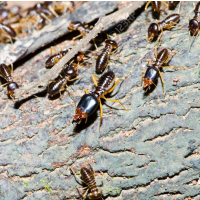$2 Billion in Annual Damage to U.S. Forests Caused by Insects Arriving in Overseas Cargo
 Wood-eating termites infesting forest
Wood-eating termites infesting forest
By Mary Esch, Associated Press
ALBANY, N.Y. (AP) — When Gary Lovett was studying the effect of acid rain in New York's Catskill Mountains 20 years ago, he ended the experiment early because so many trees in the test plots were dying — not from acid rain, but from insect attacks.
"I consider air pollution and climate change to be serious, long-term threats to the forests," said Lovett, senior scientist at the Cary Institute of Ecosystem Studies in the Hudson Valley. "But neither of those is changing the forest the way the pests are."
In a study (pdf) published this month in the journal Ecological Applications, Lovett and 15 colleagues estimated that 63 percent of U.S. forest land, or about 825 million acres, is at risk of increased damage from established pests, and new pests continue to arrive with cargo shipments from overseas.
There are more than 400 forest pests in the country with every state affected, Lovett said. New York has the most, with 62 types of pest. The Northeast and upper Midwest are the most heavily infested regions. Lovett said that's because of centuries of overseas trade from regions where tree species are similar but have evolved with insect pest resistance that U.S. trees lack.
Imported tree pests long ago wiped out eastern chestnuts and elms. Now under siege are hemlocks, ash, beech, oaks, maples and dogwood.
Imported forest pests cause more than $2 billion in damage each year, with communities and homeowners bearing the greatest cost because of the expense of removing and replanting trees that take decades to mature.
"You don't realize the cost until you have to do it," said Stanley Burgiel, assistant director of the National Invasive Species Council Secretariat, an independent council established by presidential order in 1999. "I had to take down all the oaks in my backyard, at $1,000 to $2,000 per tree."
Lovett and co-authors from Harvard Forest, the U.S. Forest Service, the Nature Conservancy, Dartmouth College, McGill University and Michigan State compiled existing data on the ecological and economic impacts of forest pests and made a case for several trade policy solutions.
Their top recommendations are to eliminate solid wood shipping pallets and end or greatly limit imports of live trees and shrubs similar to U.S. native plants.
Burgiel said progress is being made in both areas, with some major importers such as Wal-Mart eliminating wood packaging or switching to plastic for efficiency reasons, and the nursery and landscape industry taking steps such as importing plants without soil to reduce the risk of infestations.
"I think there would be resistance from overseas partners that are shipping a lot of material using these wood pallets," said Frank Lowenstein, deputy director of the New England Forestry Foundation, a conservation group based in Littleton, Massachusetts.
"But moving away from solid wood packaging could be really beneficial ecologically not only here in the United States but in some of our international trading partners' forests as well," Lowenstein said, noting how old-growth hardwood trees had been cut down in prime orangutan habitat in Indonesia to make shipping pallets in China.
Engineered wood, such as a product resembling corrugated cardboard and another made with a heat and glue laminating process, is a safe alternative to solid wood, Lowenstein said.
"These techniques are becoming more prevalent and less expensive all the time," he said. "Probably the economics are going to favor a move away from solid wood pallets regardless of the ecological benefits."
To Learn More:
Nonnative Forest Insects and Pathogens in the United States: Impacts and Policy Options (by Gary M. Lovett, Marissa Weiss, Andrew M. Liebhold, Thomas P. Holmes, Brian Leung, Kathy Fallon Lambert, David A. Orwig, Faith T. Campbell, Jonathan Rosenthal, Deborah G. McCullough, Radka Wildova, Matthew P. Ayres, Charles D. Canham, David R. Foster, Shannon L. LaDeau and Troy Weldy, Ecological Applications) (pdf)
Bark Beetles Thrive in Drought, Rampage Through California Forests (by Ken Broder, AllGov California)
- Top Stories
- Unusual News
- Where is the Money Going?
- Controversies
- U.S. and the World
- Appointments and Resignations
- Latest News
- Musk and Trump Fire Members of Congress
- Trump Calls for Violent Street Demonstrations Against Himself
- Trump Changes Name of Republican Party
- The 2024 Election By the Numbers
- Bashar al-Assad—The Fall of a Rabid AntiSemite






Comments